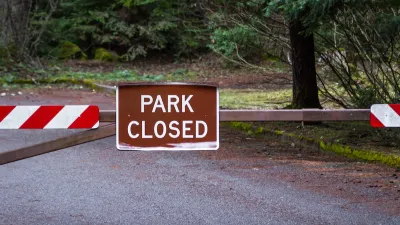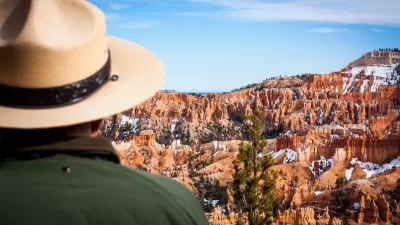Threats facing major U.S. cultural sites today include development, drilling, and the federal government.

The Cultural Landscape Foundation has issued its annual "Landslide" list of the nation's precious sites most threatened by "confiscation, development, energy and resource extraction, and other incompatible uses."
The 2017 edition, "Open Season on Open Space," includes 12 sites across the country, plus one listing that encompasses all areas potentially impacted by the ongoing federal review of national park designations. The Architect's Newspaper explains:
This year’s thirteen sites were organized based on five themes: “monetization of open space,” in which parks come under pressure to generate profit; “resource extraction,” which is under particular attack by Secretary of the Interior Ryan Zinke, who proposed relaxing management rules for six monuments, exposing them to mining and logging; “park equity,” charging to use parks or converting them to sport and cultural venues; “detrimental effects of shadow,” where the surrounding development is built up to the point where the park no longer receives adequate light; and “the devaluation of cultural lifeways,” in which ancestral lands and other sites of cultural significance are threatened.
TCLF also maintains an online database of notable cultural landscapes throughout the U.S.
FULL STORY: The Cultural Landscape Foundation announces threatened landscapes of 2017

Planetizen Federal Action Tracker
A weekly monitor of how Trump’s orders and actions are impacting planners and planning in America.

Maui's Vacation Rental Debate Turns Ugly
Verbal attacks, misinformation campaigns and fistfights plague a high-stakes debate to convert thousands of vacation rentals into long-term housing.

Restaurant Patios Were a Pandemic Win — Why Were They so Hard to Keep?
Social distancing requirements and changes in travel patterns prompted cities to pilot new uses for street and sidewalk space. Then it got complicated.

In California Battle of Housing vs. Environment, Housing Just Won
A new state law significantly limits the power of CEQA, an environmental review law that served as a powerful tool for blocking new development.

Boulder Eliminates Parking Minimums Citywide
Officials estimate the cost of building a single underground parking space at up to $100,000.

Orange County, Florida Adopts Largest US “Sprawl Repair” Code
The ‘Orange Code’ seeks to rectify decades of sprawl-inducing, car-oriented development.
Urban Design for Planners 1: Software Tools
This six-course series explores essential urban design concepts using open source software and equips planners with the tools they need to participate fully in the urban design process.
Planning for Universal Design
Learn the tools for implementing Universal Design in planning regulations.
Heyer Gruel & Associates PA
JM Goldson LLC
Custer County Colorado
City of Camden Redevelopment Agency
City of Astoria
Transportation Research & Education Center (TREC) at Portland State University
Jefferson Parish Government
Camden Redevelopment Agency
City of Claremont





























